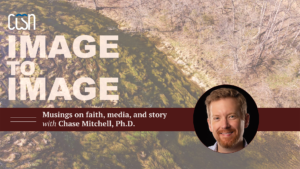 Column: Image to Image: Musings on Faith, Media, and Story
Column: Image to Image: Musings on Faith, Media, and Story
June entry: “Revelation in Reverse”
Column Description: Image to Image: Musings on Faith, Media, and Story is a monthly column that illuminates old and new ideas about media ecology from a Christian perspective. Dr. Mitchell will explore what it means to bear God’s image and Christian witness in a mediated world, with a particular focus on the relationships between theology, media, and orthopraxy across different Christian traditions.
By Chase Mitchell, Ph.D.
Assistant Professor of Media and Communication, East Tennessee State University
June 2023 / January 2023 / September-October 2022 / July 2022 / June 2022 / April-May 2022 / January 2022 / November 2021 / October 2021 / September 2021
June 2023
Revelation in Reverse
Dad died of cancer on February 21st of this year. It was unexpected, fast, and brutal. What started as a sharp pain in his abdomen quickly developed into a crippling affliction. A cancerous tumor on his kidney had metastasized and spread to his liver, pancreas, and spine. He went from being “fine” at the first of the year, to a terminal diagnosis, to hospice, to his last breath, within six weeks.
We mourn him. He was an exceptional father, husband, and friend. He loved Jesus. At the end, he shared a story with us that, I think, affords important perspective, especially for those of us who think and write about faith.
Dad told us about a long, steel I-beam that his father had acquired when Dad was a kid. He wasn’t sure where the beam came from or why his father kept it because it sat against the side of their small house, in the backyard, until Dad left for college. Dad hated “that stupid beam” because he had to trim around it when mowing the yard. The work was tedious, and he cursed the beam every summer for the headaches it caused, made worse by its apparent uselessness.
Years later, Dad bought land and built a log cabin—the place where I grew up—not far from his childhood home. A few years after we moved in, Dad decided to build a deck off the side of the cabin, which would also serve as a carport. To support its weight, he needed something that was long enough to span the width of the driveway, and strong enough to bear the load. Wood wouldn’t suffice, which presented a challenge because the support beam needed to be precisely 26 feet, 4 inches. The topography around the deck and driveway meant that one inch longer or shorter wouldn’t work.
It just happened that one of our distant relatives, Dad’s second cousin, Ed, lived on the same street. Dad remembered that a few years before he’d stopped to talk to him while walking the dog, and in passing Ed had mentioned that he’d bought the metal beam from my grandfather before he’d passed away. Dad grabbed his tape measure and went up to Ed’s house, unsure if he still had the beam, and sure that it wouldn’t be the right size. Ed wasn’t home, so Dad walked around back and there laid the beam, nearly hidden in tall grass. He stretched out the tape measure, and the beam was exactly 26 feet, 4 inches. Ed gave him the beam, and it continues to support the deck/carport, as it has done for the last thirty years.
Days from his natural end and in excruciating pain, Dad was moved to tears in telling this story. His emotion wasn’t due, of course, to the fact that the deck got built. Nor, even, do I think he was moved primarily by God’s provision, though that was part of it and also true. Rather, at the deepest level, Dad realized that it’s in the hardship—it’s precisely through the pain—that God provides. His frustration with the beam, considered in hindsight and in light of Providence, affirmed to Dad, and to us, that we must walk by faith and not by sight because God’s ways are almost always inscrutable. Still, if we humbly walk according to His will, patiently bearing life’s annoyances that have no apparent purpose, in time God does reveal. It’s most often revelation in reverse.
I’m not sure Dad would have put it this way, and he didn’t articulate it in the moment, but I think what made the revelation of the beam so poignant was what it promised. That is, Dad knew that even if he never saw, in this life, the fruit of his cancerous affliction, he could trust that God would use it for good ends. It has already led to much good—in me and in others—and I trust that God will continue to use Dad’s untimely death, and the witness he bore in suffering, to grow his Kingdom. If God uses something as mundane as a piece of steel to reveal his Goodness, then certainly He will take our life—and ultimately, even our death—and transform both for his glory. God was there, Dad’s whole life, preparing a way that at once frustrated his soul, and freed it.
Faith’s task is to trust the Love that wounds, and in so doing be healed. Dad has finished this work, to God’s glory.
